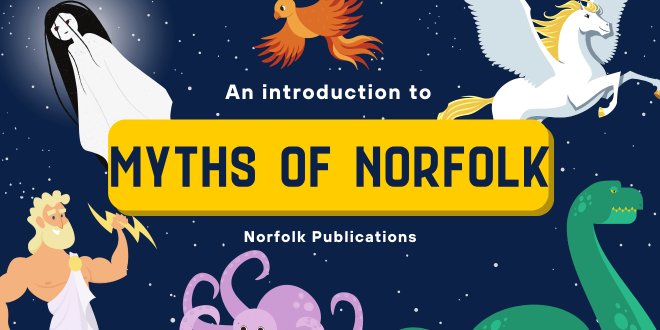Norfolk, with its sweeping coastlines, mysterious woodlands, and medieval towns, has long been a source of myths, legends, and folklore. Over centuries, stories of ghostly apparitions, mystical creatures, and supernatural events have permeated the fabric of Norfolk’s cultural landscape.
These myths are more than just tall tales—they reflect the deep connection between the people of Norfolk and the land they inhabit.
Myths of Norfolk

In this article, we will explore the fascinating myths of Norfolk, from the infamous Black Shuck, a ghostly dog said to roam the countryside, to the enchanted Dragon of Ludham, and other lesser-known legends that have shaped Norfolk’s folklore.
These stories reveal the county’s rich oral tradition and its enduring relationship with the supernatural.
1. The Black Shuck: Norfolk’s Ghostly Hound
The Legend
One of the most famous myths associated with Norfolk is that of the Black Shuck, a giant, spectral black dog said to roam the coastline and countryside of East Anglia. This legendary creature, with its fiery red or green eyes, has been reported in various towns and villages across Norfolk for centuries. According to legend, seeing the Black Shuck is an omen of death or misfortune, and those who encounter the beast are said to be cursed with bad luck.
The most famous sighting of the Black Shuck occurred in Bungay and Blythburgh on August 4, 1577. According to reports from that time, the ghostly dog stormed into both St. Mary’s Church in Bungay and Holy Trinity Church in Blythburgh, leaving behind a trail of destruction. In Bungay, the Shuck was said to have killed two people, while in Blythburgh, it left scorch marks on the church door, which can still be seen today. These events cemented the Black Shuck’s place in local folklore.
Read also: 6 Famous Artists and Writers from Norfolk: A Rich Cultural Legacy
Theories and Explanations
While some dismiss the Black Shuck as nothing more than an exaggerated folk tale, others believe that the myth may have originated from sightings of large, wild dogs or wolves that once roamed the countryside. Another theory is that the legend was influenced by Viking mythology, which also features tales of ghostly, supernatural dogs.
Regardless of its origin, the Black Shuck continues to capture the imagination of locals and visitors alike. Sightings of the phantom dog persist in Norfolk to this day, with some claiming to have glimpsed the Shuck in the misty marshlands or along the lonely coastal paths.
2. The Dragon of Ludham
The Legend
While dragons are often associated with the myths of faraway lands, Norfolk has its very own dragon legend centered in the village of Ludham. According to local folklore, a fearsome dragon terrorized the village, destroying crops and livestock. The dragon was said to live in the nearby marshes, and no one in the village was brave enough to confront it—until a heroic knight took it upon himself to defeat the beast.
The legend tells of the knight slaying the dragon in an epic battle, with the creature’s body sinking into the marshes where it was said to have resided. Some versions of the story suggest that the dragon’s ghost still haunts the area, with locals claiming to hear eerie sounds emanating from the marshes on quiet nights.
Theories and Symbolism
As with many dragon myths, the Dragon of Ludham may symbolize the forces of chaos and destruction that threatened medieval communities. Dragons in folklore often represent the unknown and the wild, and this Norfolk legend could reflect the fears of local villagers as they faced the dangers of disease, famine, and natural disasters.
While there are no marsh-dwelling dragons in Norfolk today, the legend lives on in the folklore of the county, and Ludham remains one of the most intriguing sites for lovers of local mythology.
3. The Witches of Thetford
The Legend
Norfolk’s connection to witchcraft and superstition is deep-rooted, and one of the most enduring myths is the tale of the Witches of Thetford. In the 17th century, during the height of the witch trials across England, Thetford became known as a place where witches were said to gather and practice dark magic. Stories circulated of women accused of using their supernatural powers to cast curses, bring about bad harvests, or cause illness in the town.
The fear of witchcraft was so intense that several women were put on trial in Thetford, with many convicted and executed for witchcraft. These trials were often fueled by paranoia and fear, with local superstitions contributing to the spread of the witch myth.
Legacy
The myths of the Witches of Thetford reflect the widespread fear and suspicion of women, particularly those who were elderly, poor, or lived on the margins of society. While these myths were largely based on superstition and fear, they continue to be part of Thetford’s historical narrative. Today, visitors to Thetford can explore the town’s medieval and early modern history, with the stories of witchcraft remaining an intriguing, if dark, part of its cultural heritage.
4. The Pedlar of Swaffham
The Legend
One of the more light-hearted myths from Norfolk is the story of the Pedlar of Swaffham. This charming tale tells of a poor pedlar named John Chapman who lived in the village of Swaffham. One night, Chapman had a strange dream in which he was told to go to London Bridge, where he would hear some good news. Although he initially ignored the dream, it persisted, and he eventually set off on foot to London.
After waiting at London Bridge for several days, Chapman was approached by a shopkeeper who asked him why he was there. When Chapman explained his dream, the shopkeeper laughed and told him that he, too, had had a strange dream about treasure buried under a tree in Swaffham. Chapman immediately returned home, dug beneath the tree, and discovered a pot of gold. The pedlar’s fortune was made, and he went on to donate money to the construction of Swaffham Church, which still stands today.
Symbolism and Interpretations
The Pedlar of Swaffham is often interpreted as a tale about faith, patience, and the rewards of persistence. The story suggests that following one’s dreams—no matter how unlikely they may seem—can lead to unexpected fortunes. The myth has endured for centuries and remains a beloved part of Norfolk’s folklore.
Visitors to Swaffham today can still see the pedlar’s statue in the church, commemorating this local legend and the charitable contributions of John Chapman.
5. Tom Hickathrift: Norfolk’s Giant Hero
The Legend
Tom Hickathrift, often referred to as the Giant of the Fens, is a legendary figure who is said to have lived in the marshy fenlands of Norfolk and Cambridgeshire. According to the myth, Tom was a giant of immense strength who worked as a laborer in the fens, performing feats of incredible physical power, such as moving huge stones and uprooting trees.
The most famous story associated with Tom Hickathrift involves his battle with another giant who terrorized the local area. Armed with only a cartwheel and an axe, Tom defeated the giant and became a hero in the eyes of the local villagers. After his victory, Tom was said to have become a protector of the people, using his great strength to perform acts of bravery and kindness.
Legacy and Symbolism
The legend of Tom Hickathrift is one of Norfolk’s most enduring folk tales, and the character of Tom is often viewed as a symbol of strength, resilience, and loyalty to one’s community. While Tom Hickathrift may not have been a real person, his story reflects the values of rural life in Norfolk and the importance of local heroes.
Several landmarks in Norfolk are associated with the Tom Hickathrift legend, including Hickathrift’s grave, which can be found near the village of Terrington St John. Visitors to the area can explore these sites and learn more about the giant hero’s place in Norfolk’s folklore.
6. The Phantom Coach of East Somerton
The Legend
Deep in the Norfolk Broads, the village of East Somerton is home to one of Norfolk’s eeriest ghost stories: the tale of the Phantom Coach. According to local legend, on certain misty nights, a ghostly coach can be seen hurtling down the lanes of East Somerton, pulled by spectral horses and driven by a mysterious coachman. The coach is said to vanish as quickly as it appears, leaving no trace of its presence.
Some versions of the story suggest that the coach is carrying a wealthy nobleman or a local lord, while others claim it is a cursed vehicle, doomed to ride forever through the foggy lanes of Norfolk.
Theories and Sightings
While the story of the Phantom Coach may seem far-fetched, there have been numerous reports of strange sightings and unexplained sounds in the East Somerton area over the years. Some believe the legend is rooted in actual historical events, while others suggest it is a manifestation of the region’s deep association with death and the afterlife.
Whatever the truth behind the myth, the Phantom Coach remains one of Norfolk’s most mysterious and enduring legends.
Conclusion
The myths and legends of Norfolk are as varied and colorful as the county itself. From ghostly apparitions like the Black Shuck to the heroic feats of Tom Hickathrift, these stories offer a fascinating glimpse into Norfolk’s rich oral tradition and its deep connection to the land. Whether rooted in history or pure imagination, these myths have been passed down through generations, shaping the identity and culture of the region.
For those interested in exploring Norfolk’s folklore, the county offers a wealth of opportunities to visit the locations associated with these legends and learn more about the people who first told these stories. The myths of Norfolk continue to capture the imagination, ensuring that the county’s rich cultural heritage is preserved for future generations.
 Norfolk Publications Publications ORG in Norfolk!
Norfolk Publications Publications ORG in Norfolk!

